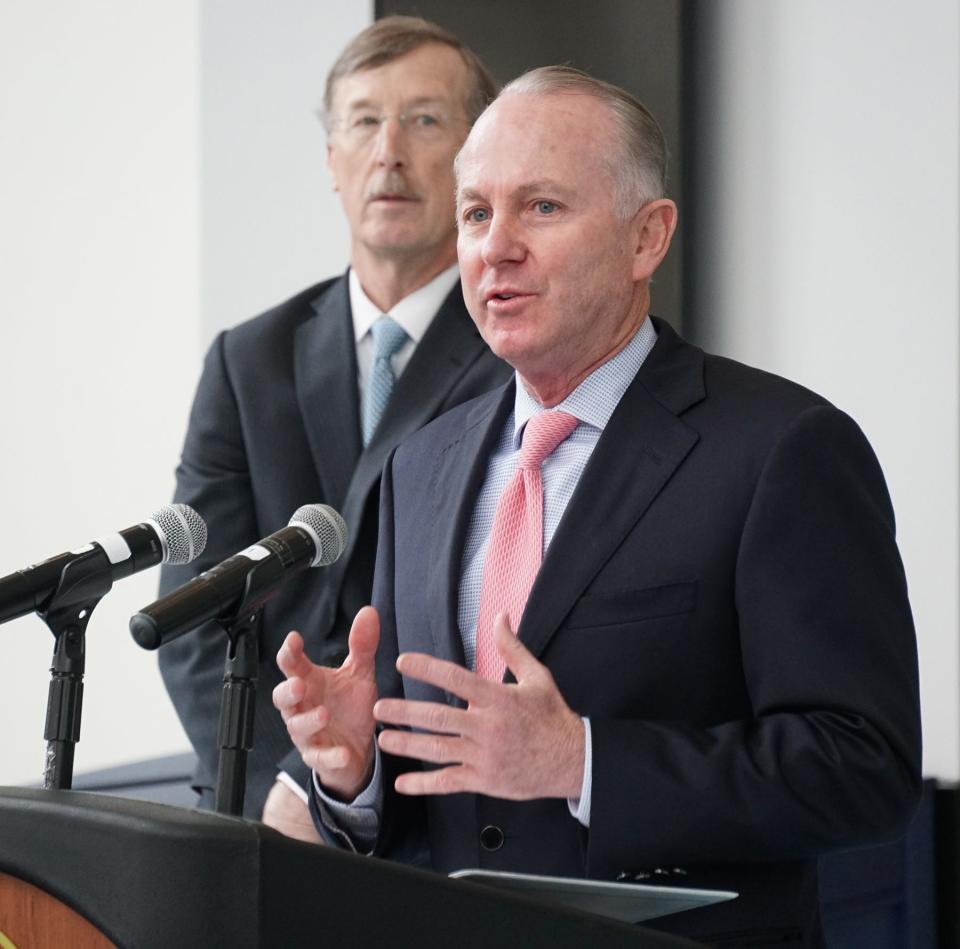Boon, or illegal monopoly? Lifespan/Care New England merger proposal has first public hearing
PROVIDENCE — In the first public hearing on the proposed merger of Lifespan and Care New England, executives from both health-care systems Thursday evening asserted that patient care would improve, research would be furthered, and all of Rhode Island would benefit if the merger, which includes Brown University as an academic partner, is approved.
That approval is now in the hands of the state attorney general’s office, the Rhode Island Department of Health, and the Federal Trade Commission. Their rulings will follow a second public hearing Wednesday and a third to be scheduled in early February.
“My ethics as a doctor would not allow me to advocate for this merger as strongly as I am advocating for if I thought in any way it would do harm,” said Lifespan president and CEO Dr. Timothy J. Babineau. "It won't. Just the opposite – this merger is in the very best interests of the patients and the communities that Care New England and Lifespan have served over the years. I believe that with every fiber in my body as a doctor.”
'Potential to be transformational': Proposed Lifespan, Care New England merger

Said Dr. James E. Fanale, Care New England's head: “We can provide equity and access to underserved populations.”
Brown’s involvement, he said, will encourage initiatives to “innovate and grow our research efforts and also provide us a boon to the economy.”
'RI's hospital staffing is in crisis': A message from nurses and doctors inside the ICU
Opposition to the merger
But the proposed merger also drew strong opposition Thursday, including from Dr. Frank Savoretti, who practices in Johnston and is affiliated with Roger Williams Medical Center, owned by CharterCARE.
“I am a humble country doctor,” Savoretti said. “I have provided primary care for the past 36 years. I also attended law school 50 years ago and I passed the bar exam in New York and then I decided to go medical school.”
Were he an attorney now, Savoretti said, he would seek “a summary judgment against this merger. It clearly will create a monopoly of medical care in the state of Rhode Island. … It’s clearly on its face illegal.”
Also opposing the merger was Edward Fontaine, who described himself as a patient now receiving health care in Boston after his needs were not met while he was receiving care from Lifespan. Dr. Luis Daniel Muñoz, a Democratic candidate for governor, was among the others forcefully opposing the merger.
Others expressed concerns but stopped short of flat-out rejection of the proposed merger.
“As a psychiatric nurse, I am deeply concerned about the potential elimination of ‘redundant services’ in the proposed merger," said Sarah Weinrich, a nurse at Butler Hospital, a CNE entity. "Our community has more mental health needs than ever and we need to be expanding services, not reducing critically needed care or staff. When we resort to staffing hospitals with the National Guard, we know something is broken. Although we recognize the good intentions and service to our community by the guard, they do not take the place of trained, committed health-care workers.”
Weinrich is a member of the SEIU 1199 New England union, which represents more than 2,300 hospital workers at CNE facilities.
So is Kelli Price, a nurse at Women & Infants Hospital, who testified: “Diversity and representation is extremely important. As a woman and a woman of color I need to know that those making decisions about my health-care needs understand where I’m coming from, and what my needs are. If you don’t have women and people of color and different ethnicities making the important decisions, then you’re unable to represent me and my interests, or the interests of the surrounding community.”
In his remarks, Rhode Island Foundation President and CEO Neil D. Steinberg summarized recommendations from a previously released foundation study, “Ensuring the Integrated Academic Health System Benefits all Rhode Islanders.”
The study, five months in the making, made recommendations regarding equity, transparency, primary care, behavioral health needs and governance, among other issues.
Said Steinberg: "We believe that this proposed merger, that this proposed integrated academic health system, done with the consideration of many recommendations that can be best for everyone in the community, could be be a model for the United States."

The latest of several efforts to combine the state’s two largest health-care systems, this merger proposal was announced on Feb. 23 by Lifespan and CNE. Brown committed to providing $125 million over five years if the merger comes to fruition.
The health-care systems in October announced that they had "submitted a revised Hospital Conversions Act (HCA) application addressing follow-up questions from the initial April 26, 2021 HCA filing submitted to the Rhode Island Department of Health and the Rhode Island Office of Attorney General," a filing that set in motion Thursday’s hearing.
This article originally appeared on The Providence Journal: Lifespan/Care New England merger proposal proponents and opponents

